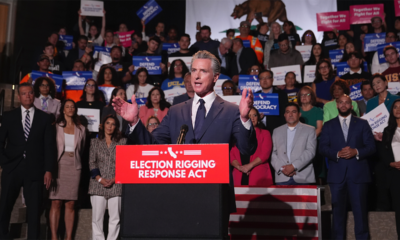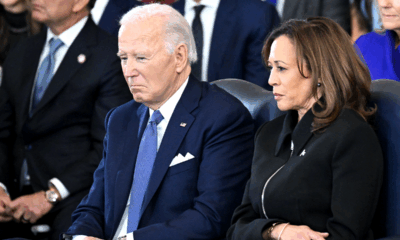Alaska
Trump vows to change the name of Denali, North America's tallest peak, despite Alaska's wishes

President Donald Trump on Monday vowed to rename North America’s tallest peak, Denali in Alaska, as Mount McKinley — reviving an idea he floated years ago that at that time saw strong pushback from state political leaders.
Trump, who took office for a second time Monday, said he planned to “restore the name of a great president, William McKinley, to Mount McKinley, where it should be and where it belongs. President McKinley made our country very rich through tariffs and through talent.” Trump also announced plans to change the name of the Gulf of Mexico to the Gulf of America.
Messages left for Alaska’s three-member Republican congressional delegation and Republican Gov. Mike Dunleavy weren’t immediately returned. Alaska’s U.S. senators in 2017 vehemently opposed a prior suggestion by Trump that the name Denali be changed back to Mount McKinley.
In 2015, then-President Barack Obama completed the change to the name Denali to reflect the traditions of Alaska Natives and acknowledge the preference of many Alaska residents.
The dispute went back 40 years, when in 1975 Alaska first expressed its desire to use the local reference to the mountain. Politicians from Ohio, McKinley’s home state, held up any movement on the request with regular legislation.
McKinley, a Republican native of Ohio who was the 25th president, was assassinated early in his second term in 1901 in Buffalo, New York.
Denali is an Athabascan word meaning “the high one” or “the great one.” The iconic 20,310-foot (6,190-meter) mountain, snow-capped and dotted with glaciers, is in Denali National Park and Preserve.
A prospector in 1896 dubbed the peak “Mount McKinley” after President William McKinley, who had never been to Alaska. The name was formally recognized by the U.S. government until Obama changed it — in spite of opposition from lawmakers in McKinley’s home state of Ohio.
Trump raised the notion of a name change again during a rally late last year, following his election.
“McKinley was a very good, maybe a great president,” Trump said in December. “They took his name off Mount McKinley, right? That’s what they do to people.”
Republican Sen. Lisa Murkowski was among those expressing opposition to a name change from Denali.
“You can’t improve upon the name that Alaska’s Koyukon Athabascans bestowed on North America’s tallest peak, Denali – the Great One,” she said at that time, adding that the issue “should not be relitigated.”
The Tanana Chiefs Conference, a consortium of Athabascan tribes in Interior Alaska, spent years advocating for the peak to be recognized as Denali.
President Donald Trump delivered his inaugural address in the Capitol after being sworn in as 47th president of the United States.

Alaska
Off-duty Alaska Airlines pilot who tried to crash plane midflight in magic mushrooms trip dodges additional prison time

A former off-duty Alaska Airlines pilot who tried to crash a San Francisco-bound flight by shutting off the engines while on a sleepless bender fueled by psycahdelic mushrooms won’t serve any additional prison time, a federal judge ruled.
Joseph Emerson was sentenced Monday to time served and three years’ supervised release by US District Court Judge Amy Baggio in Portland, Oregon — dodging a year of prison time sought by federal prosecutors.
“Pilots are not perfect. They are human,” Baggio said. “They are people, and all people need help sometimes.”
Emerson was subdued by the flight crew aboard a Horizon flight from Everett, Washington to San Francisco on Oct. 22, 2023, after trying to cut the engines while riding off-duty in the cockpit.
He told police that he was grieving his friend and had taken psychedelic mushrooms two days earlier and hadn’t slept in over 40 hours when he tried to pull the hijinx on the flight with over 80 passengers on board.
Emerson recalled believing he was dreaming and tried to wake up by grabbing two red handles that could have activated the fire suppression system and cut fuel to the engines.
Had he been successful, he would have immediately cut off the flow of fuel to the engines.
The flight was diverted and landed in Portland after the harrowing ordeal.
His attorney, Ethan Levi, described Emerson’s actions as “a product of untreated alcohol use disorder.” The distressed pilot had been drinking and accepted mushrooms “because of his lower inhibitions.”
Emerson spent 46 days in jail and was released pending his trial in Dec. 2023, with the court ordering him to stay sober from drugs and alcohol, undergo mental health services, and stay away from aircraft.
He went to treatment after jail and has been sober since, Levi said.
Before he was sentenced, Emerson said he regretted the harm he caused.
“I’m not a victim. I am here as a direct result of my actions,” Emerson told the court. “I can tell you that this very tragic event has forced me to grow as an individual.”
His wife, Sarah Stretch, also told the courtroom that she was proud of how her husband had grown since the incident.
“I am so sorry for those that it’s impacted as much as it has,” Stretch said.
One of the pilots aboard the Horizon Air flight, Alan Koziol, recalled not believing that Emerson had been trying to hurt anyone by reaching to cut the engines, and that he seemed “more like a trapped animal than a man in control of his faculties,” he recalled.
Kozial maintained that while pilots bear an “immense responsibility,” the aviation industry should allow pilots more freedom to seek mental health care.
Geoffrey Barrow, assistant US attorney in the district of Oregon, said Emerson’s actions were serious and that the crew “saved the day by intervening.”
“There were 84 people on that plane who could have lost their lives,” he said.
A passenger aboard the flight, Alison Snyder, told the courtroom over the phone that she and her husband will never feel safe flying again after Emerson pulled the near-catastrophic maneuver.
“Because of Joseph Emerson’s actions that day, we will never feel as safe flying as we once did,” she said.
Emerson pleaded guilty in September to all charges against him as part of an agreement with prosecutors.
He faced federal charges of interfering with a flight crew. A state indictment in Oregon separately charged him with 83 counts of endangering another person and one count of endangering an aircraft.
On the state level, he was sentenced to 50 days in jail, with credit for time served, and five years of probation.
The state court also ordered him to complete 664 hours of community service, half of which he can serve at his own pilot health nonprofit, “Clear Skies Ahead.”
He will additionally shell out $60,000 in restitution, mostly to Alaska Air Group, and abide by provisions on drugs, alcohol, mental health treatment, and avoiding aircraft, the state ordered.
With Post wires.
Alaska
KYUK is vital for villages in Western Alaska. Without federal funding, the station cuts staff

A small public TV and radio station in Western Alaska is a vital information source for dozens of villages damaged by the remnants of Typhoon Halong in October. But with federal funding eliminated, KYUK faces severe cuts to its staff and small news department.
NPR’s Jeff Brady reports.
This segment airs on November 17, 2025. Audio will be available after the broadcast.
Alaska
‘Punishing’: Alaska small-business owners consider next steps amid steep rises in health care costs
Thousands of Alaskans who purchase insurance through the Affordable Care Act marketplace will see their premiums skyrocket without the extension of subsidies that are set to expire at the end of the year.
The expiration of the enhanced premium tax credits could cripple small businesses in Alaska, some owners say, as they face premiums that in some cases will triple year over year, eating away at their ability to keep their businesses afloat.
“We’re working tooth and nail every day to make our way so we don’t have to rely on any help and assistance,” said Brie Loidolt, who owns a bookkeeping business in Anchorage and is facing an increase of hundreds of dollars per month in her premium costs.
Congress is “just punishing us for being small-business owners,” said Loidolt, who has weighed closing her business in response to the rise in health insurance costs.
Extension of the tax credits was a top priority for Senate Democrats during the longest government shutdown in U.S. history. But the shutdown ended Wednesday with no deal to extend the health care subsidies or provide any other measure to lower the cost of health care.
Congress now has until the end of the year to extend the credits — which were enacted in 2022 — or watch them expire.
Alaska’s U.S. Sen. Lisa Murkowski has said she supports the extension of the tax credits, at least in the short term, to avoid the projected sharp price increase. U.S. Sen. Dan Sullivan has also said he supports an extension of the subsidies. Alaska’s U.S. Rep. Nick Begich has not spoken in favor of their extension or responded to multiple interview requests on the subject.
The agreement to end the shutdown included a promise from the Senate majority leader to hold a vote on a proposal to extend the tax credits before the end of the year, but Alaskans are already being asked to make decisions about their 2026 coverage. For them, action from Congress can’t come soon enough.
“I need my government, specifically my congressional delegation, to speak for me concerning the levers of power in this country, and I feel absolutely abandoned,” said Mark Robokoff, who owns a pet supply shop in Anchorage and is staring down a more than 300% increase in the cost of insurance.
The impact of the elimination of the tax credits depends on the income, age and family size of the enrollee. Premium increases are greatest for Alaskans nearing retirement age who earn 401% of the poverty line or higher.
Of the roughly 25,000 Alaskans enrolled in plans purchased through the Affordable Care Act marketplace, many of those who will see the sharpest increase in insurance costs are owners of small businesses who say their contributions to the Alaska economy are on the line.
‘An entirely new calculus’
Robokoff said the monthly insurance premium for him and his partner is set to triple, going from $924 in 2025 to $2,886.
“This will pull the rug out from under me,” said Robokoff. “I thought I was doing the things that a society wants its members to do — create new businesses, create new jobs, improve the life of the surrounding community.”
Robokoff said that when he was younger, he went without insurance, but he now relies on medication that would cost thousands of dollars a month without insurance, so forgoing coverage is not an option.
Given the increase in the price of premiums, he said he will have to consider what changes to make in the business.
“It’s an entirely new calculus. Everything is going to have to be looked at, from the prices I pay for merchandise, the quality that I try to stock, the amount that I pay my employees to keep the best ones — every single aspect of the store is going to have to be re-examined,” he said.
Robokoff said his mindset so far has been a “fingers-crossed hope that Congress would not put us in this ridiculous situation.” He thought, “our situation is so drastic that the government can’t help but come to our aid.”
“That hope and surety is rapidly being stripped away,” he said, as lawmakers have repeatedly punted on an extension.
‘Cut us at the knees’
Loidolt, who owns an accounting firm that employs four people, said her insurance premiums are set to go up roughly $500 per month, or $6,000 for the year, without the subsidies.
She already pays $1,347 per month in premiums. Without the extension of the subsidies, she’ll be paying more per month for her health insurance than she spends on her mortgage.
“Who can afford to live when 30% of everything you bring in just pays for insurance and deductible?” Loidolt said.
Loidolt said she has tried to purchase a company plan for her business, but she learned that insurance companies largely don’t offer plans to companies in Alaska with fewer than five participating employees.
“So our hands are kind of tied there, too. It’s not like we have options and we’re choosing this more expensive option through the marketplace,” she said.
Loidolt recently suffered an accident that has left her with ongoing medical needs that would cost thousands of dollars a month without insurance. Going without insurance is not on the table, she said.
Given rising health care costs, Loidolt said she is considering shutting down her business, laying off her employees and ending the accounting services she provides to roughly 40 small businesses.
Loidolt said she thinks she could get a salaried job that comes with benefits, but closing her business would be “heartbreaking” and devastating for her clients.
“I feel like we’re part of the solution, and this is going to make us part of the problem,” she said. “We’re the people that are actually paying our bills every month. We’re not on assistance. We’re making it work, even with these ridiculous prices. We’re offering jobs with small companies. We’re offering competition to people so that the monopolies don’t take over. And they’re just going to cut us at the knees.”
[GOP plans to replace Obamacare have failed. Here’s what lawmakers propose now.]
‘It makes me want to throw up’
Nan Schleusner, a human resources consultant in Anchorage, said she and her husband — who are both sole proprietors — have relied on insurance purchased through the Affordable Care Act since the enhanced premium tax credits kicked in.
The tax credits made marketplace plans affordable for them for the first time, just as Schleusner and her husband were getting older and encountering more health concerns.
“Thank God” they got the insurance, Schleusner said, because in 2022, she was diagnosed with cancer.
“It was really wonderful when the enhanced premium tax credits took effect, because it helped with these extreme medical bills that we ended up having,” she said. “It was just that peace of mind, like, OK, it’s still a stretch — it’s not inexpensive — but we can do it.”
But now, Schleusner is facing $37,000 in annual premium payments and a $15,000 deductible for her family of three, for the cheapest plan on offer.
Schleusner said she is considering reaching out to some of the companies she consults for and asking to become their employee so she can join their insurance plan.
“I’ve been doing this 15 years, and I feel called to do it,” she said. “So I don’t want to give it up. It’s been some sleepless nights.”
Schleusner this year paid $1,380 per month for her family of three, or $16,560 in premiums for the year. To keep the same plan she currently has next year, she’d pay more than 300% of this year’s cost, with premiums totaling over $52,000 annually.
“It makes me want to throw up every time I look at it,” she said.
“There’s the affordability part, but there’s the ‘what on Earth is going on that this is costing $50,000 a year?’ That’s not a reasonable cost,” she said.
-

 Hawaii1 week ago
Hawaii1 week agoMissing Kapolei man found in Waipio, attorney says
-

 Vermont7 days ago
Vermont7 days agoNorthern Lights to dazzle skies across these US states tonight – from Washington to Vermont to Maine | Today News
-

 New Jersey1 week ago
New Jersey1 week agoPolice investigate car collision, shooting in Orange, New Jersey
-
West Virginia1 week ago
Search for coal miner trapped in flooded West Virginia mine continues for third day
-

 Seattle, WA1 week ago
Seattle, WA1 week agoSoundgarden Enlist Jim Carrey and Seattle All-Stars for Rock Hall 2025 Ceremony
-

 Business6 days ago
Business6 days agoDeveloper plans to add a hotel and hundreds of residences to L.A. Live
-
World1 week ago
The deadly car explosion in New Delhi is being investigated under an anti-terrorism law
-

 Washington, D.C1 week ago
Washington, D.C1 week agoBarack Obama surprises veterans on honor flight to DC ahead of Veterans Day

























